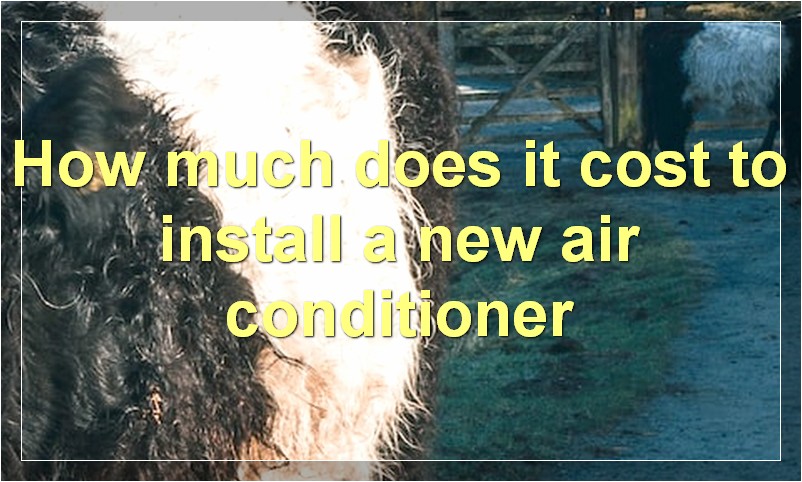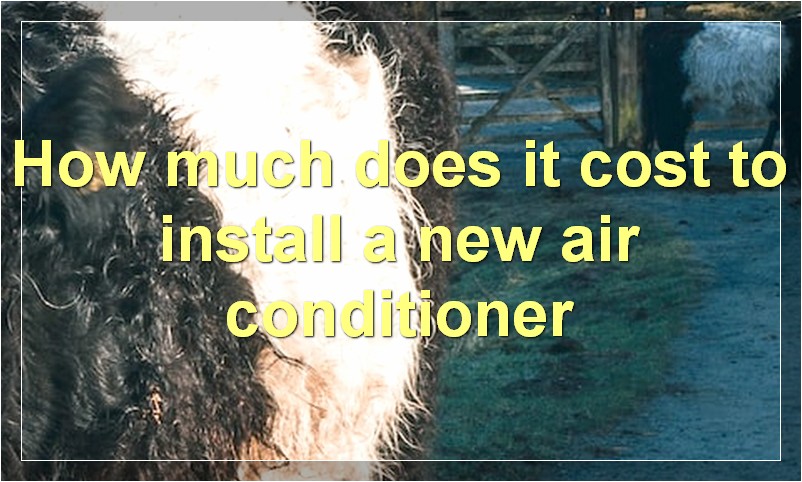You may be surprised to learn that the cost of a new air conditioner isn’t as high as you think. There are a number of factors that affect the price, and in some cases, you may be able to get a discount.
How much does it cost to install a new air conditioner?

It’s no secret that the cost of air conditioning installation can be a bit pricey. However, the cost is worth it when you consider how much money you’ll save in the long run on your energy bill. The average cost of a new air conditioner unit is between $2,000 and $5,000. The price will vary depending on the size of the unit, the type of unit, and the climate in which you live. If you live in an area with a hot climate, you can expect to pay on the higher end of that range. Additionally, the cost of labor will also affect the overall price. The good news is that there are a number of ways to save money on air conditioning installation. One way is to purchase your unit during the off-season. This is typically between October and April. You can also take advantage of special promotions and discounts that many retailers offer during this time. Another way to save money is to install the unit yourself. This can be a challenging task, but it’s certainly possible if you’re handy and have some basic knowledge of HVAC systems. Of course, if you’re not comfortable tackling the project yourself, you can always hire a professional to do it for you. The bottom line is that the cost of air conditioning installation is well worth it when you consider all of the benefits it will provide. Not only will it keep your home cool and comfortable during the summer months, but it will also help you save money on your energy bill.
How often do you need to replace your air conditioner?
If you have a central air conditioner, you may need to replace it once every ten to fifteen years. If you have a window unit, you may need to replace it more frequently.
What are the benefits of a new air conditioner?
When the weather outside is hot and humid, there’s nothing like coming home to a cool, air-conditioned house. Air conditioners make indoor life much more bearable during the summer months. In addition to providing relief from the heat, air conditioners can also help reduce your energy bills and improve your indoor air quality.
If you’re in the market for a new air conditioner, here are a few things to keep in mind.
First, consider the size of your home. A unit that’s too small won’t be able to effectively cool your entire house, while a unit that’s too large will waste energy and money. To find the perfect size for your home, consult an HVAC contractor or use an online sizing calculator.
Next, think about the type of air conditioner you want. Central air conditioners are the most common type, but they’re not always the best option. If you have a small home or a limited budget, a window air conditioner might be a better choice.
Finally, don’t forget to factor in the cost of installation when you’re shopping for a new air conditioner. Some units require professional installation, which can add to the overall cost.
Once you’ve taken all of these factors into consideration, you’ll be ready to choose the perfect air conditioner for your home.
What are the disadvantages of a new air conditioner?
A new air conditioner can have a number of disadvantages, from the initial cost to the ongoing maintenance and energy costs. Here are some of the key disadvantages to consider before buying a new air conditioner:
1. Cost: Air conditioners can be expensive, both to purchase and to run. The initial cost of the unit will vary depending on the type, size and features. In addition, you’ll need to factor in the cost of installation and any ongoing maintenance.
2. Maintenance: Air conditioners require regular maintenance to keep them running efficiently. This can include tasks like cleaning the filters and coils, as well as more complex repairs.
3. Energy consumption: Air conditioners use a lot of energy, which can add up to significant costs over time. If you’re concerned about your energy usage, look for an air conditioner with a high Energy Efficiency Ratio (EER).
4. noise: Some air conditioners can be quite noisy, particularly those with older technology. If noise is a concern for you, look for a unit with a low decibel rating.
5. Environmental impact: Air conditioners have an impact on the environment, both in terms of their manufacture and operation. If you’re concerned about your carbon footprint, look for an air conditioner with a low global warming potential (GWP).
Is it worth it to buy a new air conditioner?

As the weather gets hotter, many of us start to think about buying a new air conditioner. But is it worth it? Let’s take a look at the pros and cons.
On the plus side, a new air conditioner will be much more energy efficient than your old one. It will also be quieter and will cool your home more quickly. And if you buy a good quality air conditioner, it should last for many years.
On the downside, a new air conditioner can be expensive, and it may not be necessary if your old one is still working well. So, how do you decide whether to buy a new air conditioner or not?
Here are some factors to consider:
The cost of the unit: A new air conditioner can cost anywhere from $500 to $2,000. The price will depend on the size of the unit, the brand, and the features.
The cost of installation: You may also need to pay for installation, which can cost around $1,000.
The cost of running the unit: A new air conditioner will use less energy than an old one, so it will save you money on your electricity bills. However, keep in mind that larger units will use more energy than smaller ones.
The warranty: Most air conditioners come with a five-year warranty. This means that if something goes wrong with the unit, you won’t have to pay for repairs or replacements.
Your needs: If your old air conditioner is still working well and cooling your home effectively, then you may not need to replace it. On the other hand, if your old unit is noisy or inefficient, then a new one may be worth the investment.
So, there are a few things to consider when deciding whether or not to buy a new air conditioner. Weigh up the cost against your needs and make a decision that’s right for you.
How much does a new air conditioner save on energy bills?
If you’re looking to save money on your energy bills, a new air conditioner is a great place to start. Here’s a look at how much you can expect to save.
Air conditioners are one of the biggest energy hogs in the home, so it stands to reason that a new, more efficient model will save you money on your energy bills. How much you’ll save depends on several factors, including the efficiency of your old unit and the climate you live in.
In general, you can expect to see a 20-40% reduction in your energy usage with a new air conditioner. That means if you’re spending $100 per month on energy bills, you could see a savings of $20-$40 per month with a new AC unit. In some cases, you may even see a higher percentage of savings.
Of course, the upfront cost of a new air conditioner can be substantial. A mid-range unit will set you back about $1,500, while a high-end model can cost upwards of $5,000. However, many utility companies offer rebates and other incentives that can offset the initial cost. In some cases, you may be able to recoup the entire cost of your new air conditioner within a few years through energy savings.
If you’re considering a new air conditioner, be sure to do your research and talk to an HVAC professional to find the best unit for your home and needs. With proper installation and maintenance, your new air conditioner can provide years of comfortable cooling while saving you money on your energy bills.
How much does a new air conditioner improve indoor air quality?
We all know how important it is to have good indoor air quality. The quality of the air we breathe has a direct impact on our health, so it’s important to make sure that the air in our homes is as clean and free of pollutants as possible. One way to improve indoor air quality is to install a new air conditioner. But how much does a new air conditioner actually improve indoor air quality?
It’s no secret that old, outdated air conditioners can be a breeding ground for mold, bacteria, and other harmful contaminants. These contaminants can then be circulated throughout your home, causing respiratory problems and other health issues. Installing a new, high-efficiency air conditioner can help to eliminate these contaminants and significantly improve indoor air quality.
In addition to removing harmful contaminants from the air, a new air conditioner can also help to regulate humidity levels. High humidity levels can lead to the growth of mold and mildew, which can further degrade indoor air quality. By keeping humidity levels in check, a new air conditioner can help to keep your home’s air quality clean and fresh.
If you’re concerned about the quality of the air in your home, installing a new air conditioner is a great way to improve it. Not only will you enjoy cleaner, healthier air, but you’ll also reap the many other benefits that come with owning a high-efficiency air conditioner.
What are the different types of air conditioners available on the market?
When it comes to air conditioners, there are a lot of different types and models available on the market. So, which one should you choose? Here is a look at the different types of air conditioners available, to help you make a decision:
Central Air Conditioners
A central air conditioner is a great option if you want to cool your entire home. This type of air conditioner uses ducts to distribute the cooled air throughout your house. Central air conditioners are available in both split-system and packaged units.
Split-System Air Conditioners
A split-system air conditioner is the most common type of central air conditioner. It consists of two units: an outdoor unit and an indoor unit. The outdoor unit houses the compressor and condenser, while the indoor unit contains the evaporator. Split-system air conditioners are available in a variety of sizes, so you can choose the one that best suits your needs.
Packaged Air Conditioners
A packaged air conditioner is a great choice if you don’t have the space for a split-system unit. This type of air conditioner combines the compressor, condenser, and evaporator into one unit. Packaged air conditioners are available in both single-stage and two-stage units.
Window Air Conditioners
A window air conditioner is a great option if you want to cool a small space. This type of air conditioner is designed to fit into a window, and it doesn’t require any ductwork. Window air conditioners are available in both single-stage and two-stage units.
Portable Air Conditioners
A portable air conditioner is a great choice if you want to cool a small space. This type of air conditioner is designed to be portable, so you can move it from one room to another as needed. Portable air conditioners are available in both single-stage and two-stage units.
Which type of air conditioner is the most energy efficient?
Air conditioners are a necessary evil in many parts of the country. They keep us cool in the summer, but they also drive up our energy bills. So, which type of air conditioner is the most energy efficient?
There are two main types of air conditioners: central air conditioners and window air conditioners. Central air conditioners are more expensive to purchase and install, but they are also more energy efficient. Window air conditioners are less expensive upfront, but they will cost you more in energy bills over time.
Central air conditioners work by cooling the entire house at once. They have a large compressor that circulates coolant through a system of ducts. The coolant absorbs heat from the air inside your home and then releases it outside. This process is very efficient and can save you money on your energy bills.
Window air conditioners cool one room at a time. They have a small compressor that circulates coolant through a single unit. The coolant absorbs heat from the air inside the room and then releases it outside. This process is not as efficient as central air conditioning, and it will cost you more in energy bills over time.
So, if you’re looking for the most energy efficient option, central air conditioning is the way to go. However, if you’re on a budget, window air conditioners can be a good option. Just be aware that you will pay more for them in the long run.




